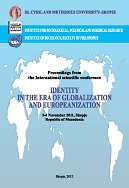
LES EFFETS DU COMMUNISME SUR LA CONSCIENCE DU PEUPLE ROUMAIN
Le fort mouvement social et culturel qui a eu lieu suite à la chute du régime communiste en Roumanie est susceptible de représenter un cas de lutte sociale à la base d’une revendication collective, telle qu’Axel HONNETH la présente dans son livre, Lutte pour la reconnaissance. L’auteur souligne l’importance des schémas de reconnaissance ou d’approbation de la part des semblables et les circonscrit dans le triptique amour-droit-solidarité, avec ses formes correspondantes de mépris: violence physique, humiliation, atteint à la dignité. La lutte pour la reconnaissance du peuple roumain vise premièrement une reconstruction identitaire et peut avoir une valeur éthique seulement dans la mesure où elle part d’un réel intérêt de celui-ci de connaître son propre destin. Elle prend alors la nuance legitime d'un savoir qui passe nécessairement par un moment herméneutique.
More...

